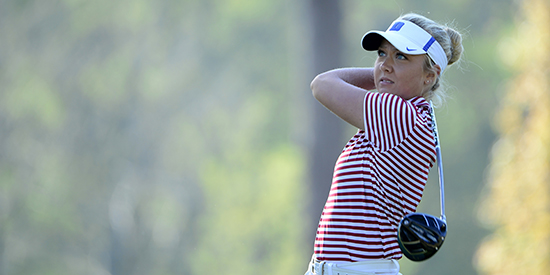
Erica Shepherd (ANWA photo)
Erica Shepherd has had this week circled on her calendar the whole year. She’s the only player in the U.S. Girls’ Junior field whose name is already on the trophy.
The Midwest lefty’s name was engraved back in 2017. Since then, Shepherd, 18, has made four more professional starts (for a total of five), competed at Augusta National Golf Club, graduated high school and won a second USGA title (the U.S. Women’s Amateur Four-Ball in May with partner Megan Furtney, a future Duke teammate). She’ll tee it up at SentryWorld in Stevens Point, Wis., this week without a caddie. This is Shepherd, 2.0.
When Shepherd looks back at her best golf in 2018, it’s been just her behind the wheel of her pushcart. At the Four-Ball, she and Furtney “were the only girls there that didn’t have caddies, really.”
“Over the past four or five years I’ve gotten a lot more independent, as far as swing-wise,” Shepherd said. “…On the course, just making my own decisions, course-management wise, I think it shows how I’ve become more independent. That’s kind of the goal that we had for me heading into Duke.”
Shepherd has often had swing coach Brent Nicoson or strength coach Mike Christman on her bag at major events. Nicoson caddied for her during the 2017 U.S. Girls’ Junior, while Christman was on the bag earlier this month when Shepherd made the cut as a sponsor invite at the Marathon LPGA Classic.
Those men are still key in her development, but as Shepherd inches closer to Duke, she inches closer to being on her own. She’ll be roughly 600 miles away from her Greenwood, Ind., home. She’d like to arrive there with one more USGA title, which is another reason she gave this week so much weight. It’s the last year she’s eligible for the Girls’ Junior, and she knows as well as anyone what spoils can come with it.
“It really opens a lot of doors,” Shepherd said of a tournament that comes with a U.S. Women’s Open exemption for the winner, a perk she reaped in 2018. “I may be biased, but I think it’s the best junior golf event in the world. I’ve been really focused on getting myself prepared for this one. I think the Marathon helped with that.”
In designing her summer schedule, Shepherd wanted to be sure she’d be fresh when she arrived at Duke mid-August. She has made three junior-golf starts since the Augusta National Women's Amateur in April. After coming up one shot short of a spot in the U.S. Women’s Amateur, she took it as a positive. She’ll be fresher for freshman move-in.
Shepherd’s invitation to the Marathon Classic was a result of a relationship made at the ANWA, where Shepherd finished T-23. The Marathon Classic tournament director caddied for Virginia Elena Carta that week, a senior on the Duke team. A few days before the event, he sent word through Duke coach Dan Brooks that he’d reserved a spot for Shepherd in an LPGA event.
“He said, ‘I think it’s kind of soon,’” Shepherd said of that phone call. It started in three days.
She already had a spot in the Symetra Tour’s Donald Ross Classic (in her native Indiana) for that week, but mulled it over for an hour and decided to enter the Marathon.
It’s at that stage where Shepherd learns the most about her game and where it’s going. The week before, 17-year-old Yealimi Noh, a fellow former Girls’ Junior champion, contended at the Thornberry Creek LPGA Classic and finished an eventual T-6. Having turned professional earlier this spring, Noh got to cash the $63,170 winner’s check.
Shepherd wasn’t surprised at all to see Noh at the top of the leaderboard. She got to catch up with Noh about it the next week. Shepherd felt zero pangs of envy.
“I think that lifestyle fits her, and I don’t think that lifestyle right now would fit me whatsoever,” she said.
After the Marathon, the most discernible difference between Shepherd and tour regulars, at least from Shepherd’s perspective, is in mindset and mental fortitude.
“They’re doing that for four or five week stretches at a time, so they’re really good at not letting one bad hole or even a whole bad round get to them,” she said.
Highland Meadows Golf Club in Sylvania, Ohio, site of the Marathon Classic, felt similar to Shepherd’s home course in Indiana. Shepherd is comfortable on Bent grass and admits “I should probably work on getting better at Bermuda.” She won the 2017 Girls’ Junior in the Midwest – Boone Valley Golf Club in Augusta, Mo. – and feels like SentryWorld might feel similarly comfortable in that way.
“The 2017 Girls’ Junior was most definitely the turning point in my junior career. That’s when I decided I had to be extremely mentally tough to be good at this game,” Shepherd said, referencing some nasty Twitter-fire sent her way after her semifinal opponent scooped up a short putt that Shepherd hadn’t yet given. It meant the match.
It was a harsh way to learn what it means to be under the spotlight, but Shepherd hasn’t backed down from her desire to be there.
The Shepherd who tees it up for the fifth and last time this week at a Girls’ Junior truly is a better version of her 2017 self. The heart that got her to that winner’s circle, however, remains the same.